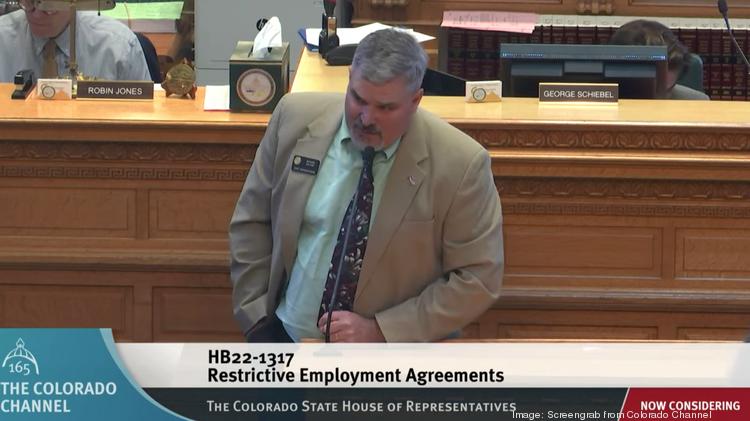Attorneys warn employers must prepare for law change on noncompete agreements - Denver Business Journal - The Business Journals
Colorado employers will need to scrutinize how they utilize noncompete and nonsolicitation agreements, as well as how they protect their intellectual property if a bill that passed the state House on Monday continues to advance through the Legislature, several attorneys said.
House Bill 1317, sponsored by Rep. Kerry Tipper, D-Lakewood, bars restrictive employment agreements from being used on anyone making less than $101,250 annually and requires that employers notify workers of the agreements before they start their jobs. It passed the House on a Democratic-led party-line vote of 40-21 Monday and now heads to the Senate for debate.
Tipper is pushing the bill because she believes such agreements, which can limit the movement of employees in their chosen field, are too rampant and are hurting many employers at this time of labor shortage. If the bill were to become law, employers who violate it could be subject to fines of $5,000 per employee, enforceable by the Colorado Attorney General’s office and subject to private lawsuits.
A pair of attorneys who specialize in employment law told Denver Business Journal that existing agreements are common enough that companies will need to study the law to understand how many such agreements they will need to scrub. And they’ll need to find alternative ways to protect the information that they value enough to have put such agreements into place.
With the law set to go into effect on Aug. 10 if signed, employers must be quick to ensure that they are not issuing new agreements after that point to anyone below the stated salary threshold and that they don’t try to enforce existing agreements on lower-wage workers, said Michael Greco, regional managing partner of Fisher Phillips’ Denver office.
An amendment added to the bill during House debate on Thursday clarifies that the $101,000 is an annualized amount regardless of when during a calendar year such an employee starts work.

Beyond that, however, workers need to be “very vigilant about how they protect their intellectual property” with only limited ability to keep workers from moving to competitors, said Sean Gallagher, a shareholder at Polsinelli.
HB 1317 continues to allow businesses to protect trade secrets and to use nondisclosure agreements, but employers will need to specify what is covered under those agreements and claims, he said.
“I think breach of noncompete agreements now will be secondary,” Gallagher said. “I think the focus will be on: Did a company protect a trade secret or did an employee misappropriate a trade secret?”
Greco said that with fewer options to keep intellectual property from migrating to competitors, employers will need to consider how much access they allow employees making less than $101,000 a year. He said that’s particularly important because while eight of the 10 states that have similar legislation on noncompete agreements as HB 1317 proposes, eight of those do not bar nonsolicitation agreements, making it easier to keep former employees from looking to win over clients from their last jobs.
The Colorado legislation comes at a time of heightened interest around such nonsolicitation agreements, which the U.S. Department of Justice has targeted as inhibiting the movement of workers. The federal government went so far as to bring criminal charges against DaVita for the use of agreements between it and several competitors to not recruit each other's high-level workers, though a jury on Friday found the Denver-based kidney-care giant and its former CEO innocent of all charges.
Questions of intellectual property and trade secrets dominated debate in the House, with Rep. Richard Holtorf, an Akron Republican who owns a small cattle feedlot, saying this could create problems particularly in smaller areas where there now is limited competition. Holtorf particularly suggested that the law could allow employees to spend just six to eight months at anything from an accounting firm to a coffee shop learning the trade and then departing to launch their own businesses that would then take their former employers’ customers.

Tipper, however, argued that HB 1317, rather than hurting employers, could aid employers who now are having a hard time filling open slots and who might not have the resource to challenge employment agreements that already should be limited, according to law.
“There are employers who find themselves on the other side of this, trying to recruit talent and they can’t,” she said. “Or they don’t have lawyers to fight these noncompete agreements.”
While Greco and Gallagher said they don’t expect an overabundance of prosecutions by the AG’s office, both said they believe that certain plaintiff’s attorneys could be opportunistic in filing lawsuits against employers with whom those workers may have issues.

Gallagher also said he believes there could be at least one unforeseen circumstance coming from the bill — the issue of employees moving between states for jobs. Because the bill specifies that any challenges to noncompete agreements will be adjudicated in the home state of the workers challenging them, he questioned whether workers who move to Colorado will be under the laws of this state rather than the states they were in when they signed the agreements.
“I think it’s going to create all kinds of litigation because some of the terms in this (proposed) statute are vague and untested,” he said. “I think there is an opportunity for people to move to Colorado if they want to negate an otherwise enforceable noncompete.”
HB 1317 likely will be assigned to a Senate committee in the next day or two. The Legislature has until May 11 to consider all bills before its scheduled adjournment.
source: https://www.bizjournals.com/denver/news/2022/04/18/colorado-legislature-noncompete-agreements-lawyers.html
Your content is great. However, if any of the content contained herein violates any rights of yours, including those of copyright, please contact us immediately by e-mail at media[@]kissrpr.com.

